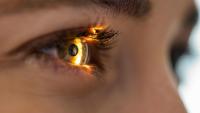Medical/Specialty Contact Lens Service
Make an Appointment
Our team is here to help you make an appointment with the Medical/Specialty Contact Lens specialists you need.

At Columbia, our experienced contact lens specialists fit custom contact lenses for a range of eye conditions.
Who needs specialty contact lenses?
Specialty contact lenses are designed for people who can't achieve optimal vision, fit or comfort with regular soft contact lenses. For example:
- Irregular Cornea Shape: Conditions such as keratoconus, pellucid marginal degeneration, or complications following LASIK or corneal surgery can cause the cornea to have an irregular shape.
- Corneal Disease: Injuries, burns, growths on the eye (like pterygium or pinguecula) can make it difficult to wear regular contacts comfortably. Specialty lenses can provide a better fit and address these underlying conditions.
- Dry Eye Disease: Stem cell failure or deficiency, dry eye disease and discomfort or visual problems with regular contact lens can sometimes be treated with custom contact lenses.
- Vision Problems: People with high levels of nearsightedness (myopia), presbyopia (age-related difficulty focusing on near objects), or severe astigmatism might find regular lenses inadequate for correcting their vision. Specialty contact lenses can provide a more precise correction for these conditions.
What are some examples of specialty contact lenses?
- Specialty Soft Contact Lenses: While still considered "soft," specialty soft contacts may be made from different materials or have unique designs compared to standard soft lenses. They might be slightly more rigid or have greater parameter availability to provide a better fit on irregular corneas.
- Gas Permeable Contact Lenses: Gas permeable contact lenses, also sometimes called rigid gas permeable lenses, are a type of hard contact lens made from silicone-containing compounds that allow oxygen to pass through the lens to the cornea. These custom-tailored contact lenses can be used for high astigmatism, high refractive error, presbyopia and irregular corneas.
- Hybrid Contact Lenses:A type of contact lens that combines two different materials – a rigid gas permeable center with a soft skirt-like outer ring. The soft ring provides improved comfort and stability when the lens is placed on the eye.
- Prosthetic Contact Lenses:A type of specialized soft contact lens designed to address cosmetic concerns and improve the appearance of one or both eyes. Common reasons why someone might consider prosthetic contact lenses include aniridia, albinism, corneal scarring, and/or a post-surgical appearance. Specialty tinted lenses can also improve visual clarity by increasing contrast in images, a property that is of particular importance in select sports or occupations where the highest visual acuity is crucial for top performance.
- Scleral Contact Lenses: Unlike regular contacts that sit directly on the cornea, scleral lenses are much larger in diameter and rest on the sclera. These large diameter rigid gas permeable contact lenses vault over the cornea entirely. Scleral lenses combine several benefits in one design. They create a lubricating reservoir for comfort, provide a layer of protection for the eye, and improve vision by creating a smooth, stable optical surface.
- Eye Print Prosthetics (EyePrintPRO™): At the forefront of innovation, Columbia Ophthalmology utilizes technologies like EyePrintPRO™ to create custom scleral contact lenses. This method takes a physical mold of your eye, resulting in a noticeably more comfortable and precise fit.
- MiSight® 1 day: Dr. Keh is certified to fit the first and only soft contact lens designed for myopia management. This single use lens is FDA-approved to slow the progression of myopia in children as young as 8 years of age.
Are specialty contact lenses covered by insurance?
Our knowledgeable staff can help you navigate your insurance coverage for medically necessary contact lenses. Coverage details and requirements vary depending on your individual health plan and the specific reason why you need them.
How do I make an appointment?
We offer medically necessary contact lens consultations with our residency-trained optometrists. Our specialty contact lens fitting services are conveniently available at multiple locations throughout New York City and in Scarsdale, NY.
Make an Appointment
Our team is here to help you make an appointment with the Medical/Specialty Contact Lens specialists you need.
